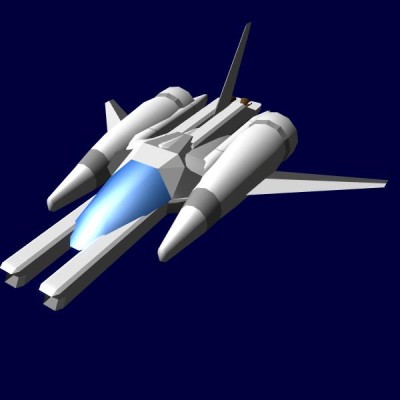Table of Contents
Scoliodon Heavy Fighter
The Scoliodon is the Azorean's second class of Starfighter and first Heavy Fighter; it was designed to fill a heavy attack role as well as operate as a long range FTL capable reconnaissance fighter. The Scoliodon went into production in the year YE 36.
About the Ship
The Nevah project produced along side the Hammerhead, a fighter. It was thought that ships would need fighter escorts. The technology is primarily from the same places as the Hammerhead's - the Nevah, a gift from Toshiro.
Key Features
The Scoliodon features heavier weaponry than the smaller Mako class and is capable of mounting a long range sensor pod to its main centerline underside hardpoint.
Mission Specialization
- Planetary Defense
- Large Ship Defense
- Anti-Fighter, Anti-PA Defense
- Anti-Ship
- Ground attack
- Reconnaissance
Appearance
The Scoliodon heavy fighter is larger and more capable than it's counterpart, the Mako. The Scoliodon seats two crew side by side in a wide and comfortable cockpit set forward in the fuselage. Behind the cockpit and to the sides are large nacelles containing the main sensor arrays forward and the components for the crafts FTL system in the back. Between these, occupying the aft portion of the fuselage are the main sub-light plasma engines. The Scoliodon has long swept wings that stretch back from the center of the ship and a single tall vertical tail fin attached between the main engines aft. Flight control thrusters are located on the wing and tail tips as well as in key spots on the hull.
The Scoliodon's primary weaponry, a pair of fixed forward disruptor cannons, are located. Along the Scoliodon's underside are five external hard points for attachment of bombs, missiles or other externally attached weaponry or hardware.
History and Background
With the success of the Mako-class Starfighter, it was decided that a heavier fighter capable of additional roles was needed to balance out the requirements of the fledgling Azorean defense force.
Statistics and Performance
General
- Class: Scoliodon
- Type: Heavy Fighter
- Nomenclature: Az-V2-1A
- Designers: The Nevah project
- Manufacturer: Azorean Commonwealth
- Fielded by: Azorean Naval Legion
Passengers
Crew: 2: 1 Pilot, 1 Weapon/Electronics Specialist, seated side by side.
Dimensions
- Length: 17 meters ( feet)
- Width: Hull: 3 meters ( feet) Fins: 7.5 meters ( feet)
- Height: Hull: 3 meters (9.84252 feet) Fins: 6 meters (19.685 feet)
Propulsion and Range
- Sublight Engines: .25c
- FTL Engine:
- Range: 5 hours
- Lifespan: Expected 30 years with refits
- Refit Cycle: Unknown at this time, Estimations stand at yearly
Damage Capacity
- Hull: 7
- Shields: 7 (Threshold 3)
Inside the Ship
Cockpit Module
The Cockpit Module Manned:
- Pilot & Co-pilot couches with five point restraint harness.
- Physical controls for all systems
- 2 Ejection rockets with a 30 second burn.
- Emergency subspace locator beacon with manual kill switch
- First Aid Kit attached to cockpit interior
In the event of the catastrophic damage the cockpit can separate from the fighter to serve as an escape pod.
Ship Systems
Armored Hull and Hull Integrated Systems
The Hull is made out of Durandium Alloy.
Communication Systems
The Scoliodon uses communication technologies that were designed off of the vampire class ship involved in the Nevah project. While not as sophisticated as those on most other faction military vessels, they cover the basics (subspace and radio) and provide an acceptable amount of security. In a emergency, the communications system can act as a low resolution sensor system, by using the two receivers to pinpoint radio or subspace transmitters, much in the same way that primitive radar does.
Life Support Systems
This ship employes special generators for water and air recycling. These same systems cause the air with in the ship to become moist, this both keeps the Azoreans hydrated and feeling at home.
Propulsion
Based off of technology given to the Azoreans, the Scoliodon uses Plasma Thrusters to push it through space at sub light speed. For FTL travel, the Scoliodon uses a miniaturized and less capable version of the space fold drive used on their capitol ships. The Scoliodon powered by a fusion reactor.
Shield Systems
Again, based off of what was gained in the Nevah project, the Scoliodon has an efficient shielding system. It relies on a teardrop-shaped spatial distortion, to warp space around the ship, to alter the course of lasers, missiles, etc. A second system, called “the spike,” only protects the front of the ship, acting as a giant cone, it protects the ship from collisions during high-speed space flight. Both of the shields can take a lot of damage but are not infallible, and fail after a few good hits.
Sensor Systems
The Scoliodon uses a radar and radio telemetry system to navigate through space. Though it may be a little inefficient, it gets the job done. the Radar has an effective range of 200,000 Km. Radio Telemetry doesn't have a range it uses navigational Buoys that transmit on fixed frequency.
They also use magnetic anomaly to scan for close in meteorites. Range 50,000 Km
Infrared sensors rigged in two modules one working the IR bands, the second running near IR bands. Range 5 light years.
Landing gear
Landing gear are built around a skid system, though wheeled landing gear could be installed if needed, or if based on a land based air field. The skids have electromagnetic pads on the bottom, for latching on the decks or exterior of ships.
Weapons Systems
- Azorean Disruptor: 2 forward facing system, Tier 9, Heavy Anti-Mecha each
OOC
Special Thanks To Gunsight1, who did 90% of the writing for this article. YAY HIM!!!
